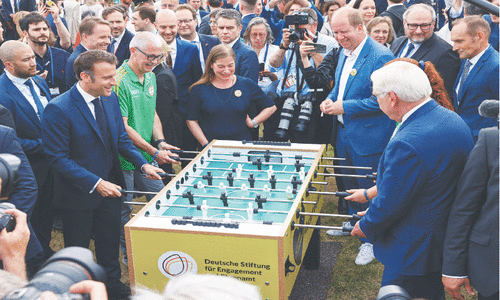JEDDAH, April 23: Religious hardliners endorsed by ulema swept to victory in local polls in Jeddah, clinching all seven seats on offer, according to results released on Saturday. The hardliners’ widely anticipated win followed similar victories in Makkah and Medina after Saudi men voted on Thursday to elect half the members of municipal councils in an unprecedented nationwide ballot.
Several western and northern regions were covered in Thursday’s final round. Women were barred from the three-stage polls, which began in February.
The Jeddah winners — Bassam Akhdar, Bassem al Shareef, Hassan al Zahrani, Rabah al Dhaheri, Hussein Baakeel, Hussein al Bar and Abdul Rahman Yamani — ran separately in each of the Red Sea city’s seven constituencies but were backed as a group by influential ulema, including Sheikh Safar al Hawali.
The seven, dubbed the “golden list”, survived an attempt by rivals to disqualify them from running after experts ruling on election disputes concluded that they had not violated rules barring the formation of electoral lists.
Losing candidates now have a week to challenge the results.
Religious hardliners also came out on top in the capital Riyadh and the main eastern city of Dammam in earlier phases of the polls and in the resort of Taef, near Jeddah, in the third round.
But they did less well in Al Qassim, a region some 300 kilometres north of Riyadh seen as the heartland of the Wahhabi faith.
They managed to win just two of six seats up for grabs in the regional capital Buraida and two out of five in nearby Unaiza, with businessmen and civil servants winning the remaining mandates.
The radicals also took three of the six available seats in the northwestern city of Tabuk.
The wins have been at least partly attributed to good organization.
The winners can be considered “moderates — more open than the official religious establishment and the Wahhabi current — or technocrats with religious leanings,” lawyer Abdul Aziz al Kassem said.”There is no doubt that those who won had organizational skills, most of them having studied in the West,” he said.
A total of 244 seats were up for grabs in Thursday’s third round, which completed the election of half the members of 178 municipal councils across the country.
The remaining seats will be filled by the government. —AFP












































Dear visitor, the comments section is undergoing an overhaul and will return soon.